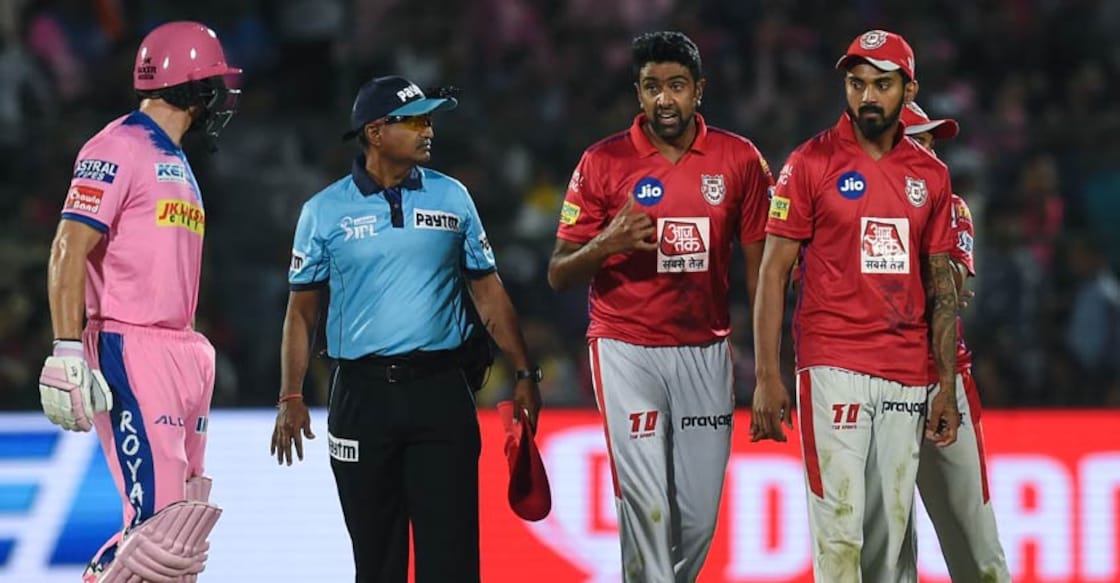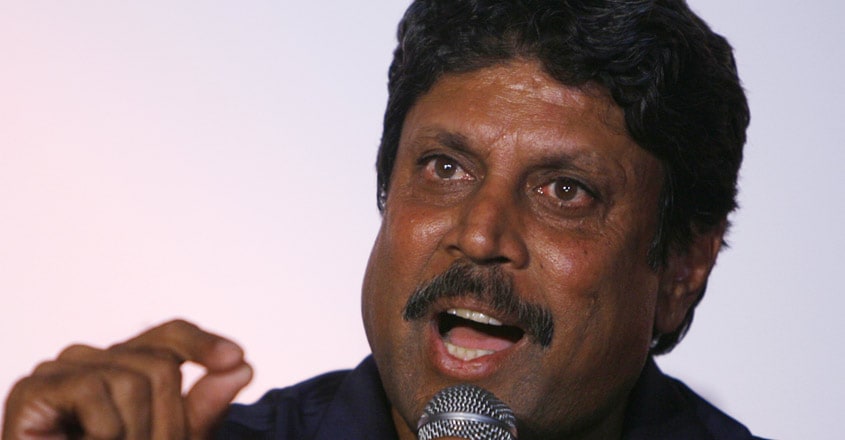'Mankading' and fair play

Mail This Article
Kings XI Punjab (KXIP) captain Ravichandran Ashwin hogged the headlines during the first week of the Indian Premier League (IPL) Season 12 on account of the controversy created by running out Jos Butler in the match against Rajasthan Royals (RR). Ashwin saw that Butler had left the crease at the non-striker's end even before he had delivered the ball and removed the bails and appealed for a run out. The appeal was upheld by the third umpire who found that Butler was indeed outside the crease when the bails were removed.
The England wicketkeeper-batsman was not pleased with the turn of events and indicated his anger in no small measure before leaving the field. This dismissal turned the tide in favour of KXIP as Butler was in great form and RR’s chase lost momentum after he returned to the pavilion.
Ashwin’s action drew huge criticism from the experts and fans who felt that what he did was unfair. Many were of the opinion that he should have warned Butler before attempting to run him out. There was another section that felt that while his action was within the ambit of law, what he did was morally incorrect. Spin legend Shane Warne, who is also the brand ambassador of RR, was one of the loudest critics, terming the action as “disgraceful, embarrassing and against the spirit of the game”.
The rule
Let us first see what the laws of the game have to say in this regard. Statute of cricket lays down that any attempt by the batsman to steal a run before the bowler delivers the ball is unfair. Law 41.16 states that If the non-striker is out of his/her ground at any time from the moment the ball comes into play until the instant when the bowler would normally have been expected to release the ball, the non-striker is liable to be run out. In the present instance Butler left the crease after Ashwin started his run up, but before the bowler reached the position where ball was expected to be released and hence the appeal as well as the decision of umpire were correct.
The significance behind this provision of law is the fact that neither batsman should attempt to steal a run. While the striker is expected to look for runs only after facing the delivery, non-striker is bound to stay inside his crease till the ball is released by the bowler. Any action on the part of either striker or the non-striker that contravenes this basic presumption would amount to stealing a run, which is considered to be unfair. It is to deny the batting side any unfair advantage on this score that the provision for running out the non-striker who leaves the crease before delivery of ball, is placed in the statute book.
A quick look at the history of the game would indicate this mode of dismissal is not all that unusual. Vinod Mankad had run out Bill Brown of Australia twice during India's tour Down Under in 1947-48, which is the reason for this type of dismissal to be known popularly as “Mankading”. Since then there have been three such instances in Test cricket and many more in limited overs version of the game. During India’s tour of South Africa in 1992, Kapil Dev had ran out Peter Kirsten in this manner during a One-Day International, which provoked an angry response from South African skipper Kepler Wessels who swung his bat at the foot of the bowler soon after. Fortunately, Kapil was man enough not to retaliate or hurl a bouncer from 18 yards, either of which would have left a black mark over the first official tour undertaken by a cricket playing country to South Africa since 1970.
If the laws of the game are clear and there are many precedents in the game in this regard, why has there been an uproar over this matter? This is invariably due to the sympathy that the viewers have for the batsman, who is perceived to have been dismissed not by the ability of the bowler. Cricket is ultimately a game between bat and ball and neither are involved in this mode of dismissal. Further, popular sympathies are always with batsmen, not merely because more people come to see runs being scored, but on account of the fact that invariably willowwielders can afford only one mistake while bowlers get a minimum of six deliveries to show their worth. Batsmen who get out in this manner feel angry, more at themselves for doing something outrageously silly, though this is invariably expressed as indignation against an unjust act.

Bizarre dismissals
This dismissal also brought to mind some of the unusual dismissals in the history of the game, two of which took place on the last day of the second Test between Pakistan and Australia at Perth in 1979. Pakistan had batted first and scored 277 runs in the first innings and Australia replied with 327, thus gaining a lead of 50 runs. In the second innings, Alan Hurst of Australia ran out Sikander Bakht, the No. 11 of Pakistan, when the latter left his crease at the non-striker's end before the former delivered the ball. Pakistan were dismissed for 285 in their second innings, setting the hosts a victory target of 236.
Australian opening batsmen Andrew Hilditch and Rick Darling had taken the score to 87 when the latter played the ball to cover region. The fielder threw the ball to non-strike'rs end. Assuming that the ball was dead, Hilditch picked it up and threw it to Sarfraz Nawaz who was the bowler. Sarfraz froze in his tracks and appealed for “Handling the ball”. The umpire had no option, but to uphold it since ball was very much in play as it had not come to rest either with wicketkeeper or the bowler.
For the record Australia won the match by seven wickets and squared the two-Test series. But the focus of critics and followers of the game after the match was not on the result, but the action of Sarfraz which was widely condemned as unsporting. It was evident to everyone that Hilditch had not tried to intervene unfairly in any manner and his was a spontaneous friendly gesture, routinely done by players all over the world. Though Sarfraz remained unrepentant, his skipper Mushtaq Mohamed was apologetic, saying that both incidents, Bakht's run out and Hilditch's dismissal, should not have happened.
In this connection, I should also bring to light two unusual dismissals where I was part of - first as a player and the other as an umpire. In an inter-collegiate tournament at Kochi in late 1970s, I was batting in the company of the last batsman. I wanted to shield my partner and was looking for a single off the last ball of the over bowled by a fast bowler. I played the ball in front of the wicket and took off for a run. I could see the bowler charging forward in his followthrough to pick up the ball and hurl it at the stumps. I had initially planned to run over the ball to the non striker’s end, but suffered a momentary “brain fade” and instead kicked the ball away from the bowler. The appeal from the fielding side was instantaneous and the umpire promptly upheld it. I knew that I had obstructed the field and did not even bother to wait for the decision. I was disappointed and angry with myself as I knew that I did something remarkably stupid.
The second instance took place when I was umpiring a Ranji Trophy match between Orissa and Tripura at Cuttack in December, 1997. Orissa batted first and in reply, Tripura lost their ninth wicket at the stroke of drinks interval. As per the laws prevailing at that time, drinks was part of playing time and an incoming batsman was expected to cross the outgoing one at the fence. Law mandated that a new batsman shall be out “Timed Out” if he wilfully took more than two minutes to come in, the two minutes being calculated from the time the wicket fell till the new batsman stepped on to the field of play.
During drinks interval, I noted seeing Hemu Dayal, last batsman of Tripura, outside the boundary. But when the players came back after refreshments, he was not to be seen. Sanjay Raul, captain of Orissa asked whether he could appeal for “Timed Out”. I informed him that appeal could be made only after batsman enters the field of play. After a couple of minutes Hemu trooped in and Orissa players appealed. Now myself and my colleague had to determine whether the delay was intentional and hence asked Hemu the reasons for the delay. He appeared startled by our question and said that he did not have any particular excuse for being late. Then we asked Raul whether his side was persisting with the appeal. On getting the response that they were going ahead with the appeal, I gave the decision “out”.
It was only about a month later that I got the message from the chief statistician of the Board of Control for Cricket in India that they were planning to report this decision as the first of its type in first class cricket in the world. This was widely reported in the newspapers at that time and thus me and my colleague (S. Dendapani from Kochi) had our share of fame! Subsequently, it was reported that two such dismissals had been recorded in South Africa during the time that country was barred from international cricket. When the International Cricket Council decided to grant first class status to matches held in South Africa during the period from 1970 to 1991, these data were also incorporated and thus our names vanished from the record books!
To conclude, I stand by Ashwin in that what he did was legal and correct. The action of Butler in trying to steal a run was unfair and it met with a deserving fate. All the players who take part in the IPL are experienced enough to know the rules as well as the penalty for contravention of the same. Butler had only himself to blame for getting dismissed in this manner and placing his side on the back foot.
(The author is a former international umpire and a senior bureaucrat)


